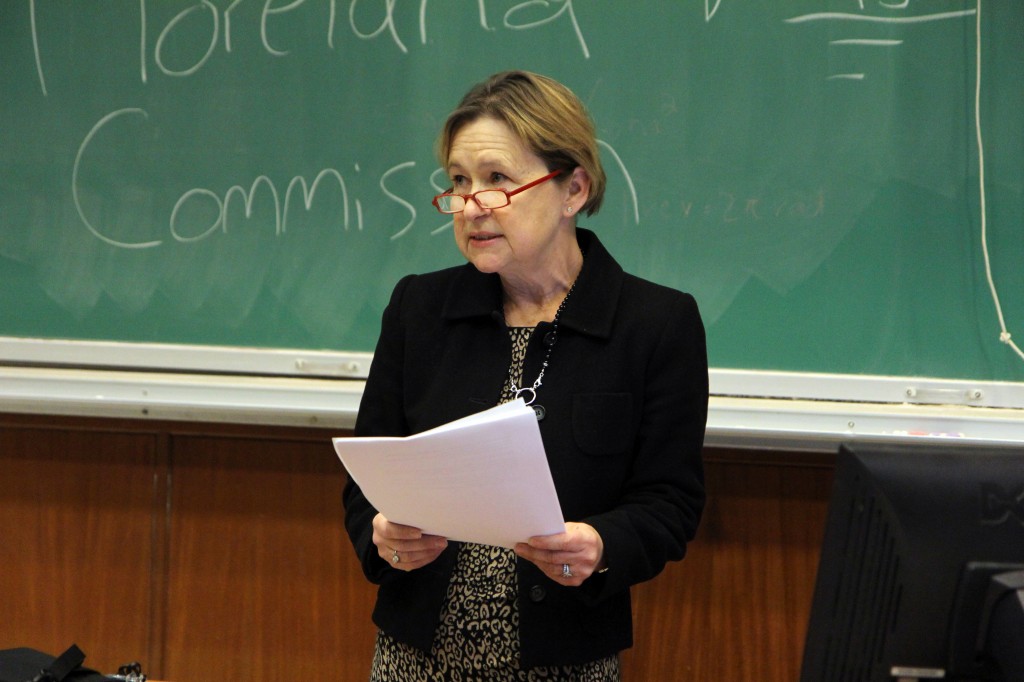
Amid ongoing debate regarding the economic benefits gas drilling could bring to New York state, Jannette M. Barth, Ph.D., delved into the often exaggerated realities of a potentially destructive industry.
“Despite all the industry rhetoric, I’m here to tell you tonight that shale gas development will really not be good for the economy of New York state,” Barth said. “It will not create a lot of good jobs for New Yorkers, and it will devastate the economy in other ways.”
Shale gas, which has become an increasingly important — and contentious — source of natural gas in the United States, and its development has been a topic of focus for Barth, an economist with Pepacton Institute LLC, a research and consulting organization.
Sponspored by New York Public Interest Research Group (NYPIRG), in coalition with Vestal Residents for Safe Energy (VERSE), I.D.E.A.S. and Democracy Matters, Thursday night’s event, titled “Frackenomics,” revolved around the concept of moving past fossil fuels.
Barth has spent the last five years investigating economic claims made by the gas industry. She believes, according to her research and work experience, that renewable energy will help the New York economy in ways that fossil fuels cannot.
Matthew Lemke, projector coordinator for NYPIRG, also encourages investment in renewable energy, not fossil fuels.
“CO2 in the atmosphere is at its highest level ever, the sea levels are rising and politicians are crippled by inaction and special interests,” Lemke said. “If we don’t do something soon, it’s going to have drastic consequences on our environment, on our health and on our way of life.”
Barth focused on tackling sweeping claims made by the oil and gas industry, which say that shale development will bring a lot of jobs to New York state. She urged caution in choosing which sources to listen to because “numbers can be highly exaggerated.”
After looking at the economic situations of counties that allowed shale gas extraction, Barth concluded that there were few benefits.
“The results were that the unemployment rates were higher, poverty rates were higher and household income levels were lower … in the gas-intensive counties,” Barth said.
Similar results have been found across the United States, the highest levels of long-term poverty tending to be found in the very places that were once the sight of thriving extracting industries, according to Barth.
Barth continued to explain that counties that did not rely on fossil fuel extraction as an economic development strategy had higher growth rates, more diverse economies, better educated populations and a small gap between high- and low-income households.
Her research covered different states as well, including Pennsylvania, West Virginia, Texas and Ohio.
“While natural gas production grew by 87 percent in West Virginia, only 916 jobs were added, and the gas-intensive counties in West Virginia experienced a rise in the unemployment rate from 4.4 percent to 6.9 percent,” Barth said.
Promises of job gains from fracking have been made across the country, but that reality has been slow to materialize. Additionally, industries vital to the economy of upstate New York will take major hits because of shale gas development.
“We need energy, we need jobs, we don’t want to destroy our great upstate industries, landscapes and clean water that New Yorkers love, enjoy and rely on,” Barth said. “So is there a solution? Yes, there’s a far better alternative.”
Students in attendance echoed the beliefs of the event’s speakers.
“I was glad to hear about the wind, water and solar alternatives,” said David Rodriguez, a junior majoring in geography. “They were reasonable enough that I could see them being implemented in the near future.”
Al Tricomi, a retired English professor from Binghamton University and a member of VERSE, encouraged action in order to see change, as did Barth.
“Know your power,” Tricomi said. “We’re hoping that you will become activists, or at least active in your verbal opposition to fracking.”


